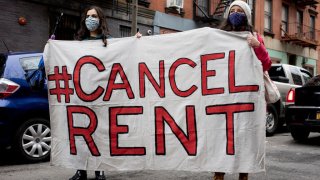
- The CDC will keep its national moratorium on evictions in effect through June 30.
- The protection was slated to expire in just a few days.
The Centers for Disease Control and Prevention has extended the national ban on evictions through the end of June.
"The COVID-19 pandemic has presented a historic threat to the nation's public health," CDC director Dr. Rochelle Walensky said in a statement. "Keeping people in their homes and out of crowded or congregate settings — like homeless shelters — by preventing evictions is a key step in helping to stop the spread of COVID-19."
The eviction ban was scheduled to expire in two days, and advocates warned of a spike in evictions without an extension.
Get top local stories in Southern California delivered to you every morning. >Sign up for NBC LA's News Headlines newsletter.
Around 20% of adult renters said they didn't pay last month's rent, according to a survey published in March by the Census Bureau. Closer to 33% of Black renters reported the same.
More from Personal Finance:
Four months behind on rent, he got help from his landlord
More than 2,000 organizations urge Biden to extend eviction ban
What to know about applying for some of the $45 billion in rental aid
Likely informing the health agency's decision to extend the ban for three months is the fact that mass evictions could undermine the country's attempts to get the coronavirus pandemic under control. That's because many displaced people double up with family members or friends or are forced to turn to crowded shelters.
Money Report
During the pandemic, 43 states and the District of Columbia temporarily prohibited evictions, some for as little as 10 weeks. Researchers found that allowing evictions to continue in these states caused as many as 433,700 excess cases of Covid-19 and 10,700 additional deaths in the U.S. between March and September, when the CDC ban went into effect nationwide.
"When you're looking at an infectious disease like Covid-19, evictions can have an impact not only on the health of evicted families, but also on the health of the broader community," said Kathryn Leifheit, one of the study's authors and a postdoctoral fellow at the UCLA Fielding School of Public Health.

At least two federal judges have questioned the CDC's power to ban evictions. And property owners have criticized the policy and say landlords can't afford to continue housing people for free.
"Short-term policies like eviction moratoria leave renters accruing insurmountable debt and jeopardize the ability for rental housing providers to provide safe, affordable housing," said Bob Pinnegar, president of the National Apartment Association.
Housing experts said that it wouldn't have made sense to allow the eviction ban to expire before rental assistance goes out to people. Congress has now allocated more than $45 billion in aid for renters, but it could take a few months for the money to be disbursed.
The CDC's eviction ban applies to individuals who earn less than $99,000 a year and couples who make under $198,000. To qualify, renters also have to attest on a declaration to their landlord that they're unable to afford their rent and that being evicted could result in them doubling up with others or becoming homeless.






